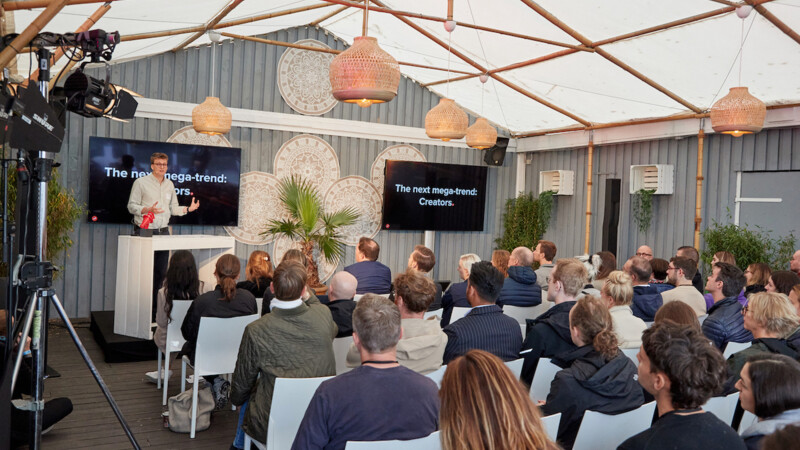The target group, Gen Z, should not be overlooked, according to Jack Riley, winner of the 2022 Scoop Award and an expert on monetization strategies in journalism. Young people's changing media usage is a benchmark for journalism in future. Journalists and publishers must take high-resolution videos and good algorithms into account in their quest to reach Gen Z. This trend holds an opportunity for journalists and publishers as it opens up a new perspective on journalism of the future and its monetization.
Experts in various media fields have made their New Year's predictions for key technologies, innovations and developments in the categories Digital Publishing & Journalism, Digital Marketing, Audio, Platforms, Moving Image, Creator Economy and Metaverse, according to nextMedia.Hamburg. The following is an overview.
1. Digital publishing – journalism for Gen Z

2. Artificial intelligence in digital marketing
Creative artificial intelligence tools are increasingly accessible and deliver amazing results. Thus, work by creative agencies can be replaced easily, according to Ramin Ataei, Managing Partner of Justaddsugar marketing in Hamburg. Yet, this trend holds an opportunity. "Creativity has not changed. But the way companies apply creativity needs to change. It needs to move towards problem solving. Teams of creatives and strategists should design business solutions using AI and intelligent automation." Monotonous routine tasks would be eliminated and this would free up space and time for more innovative and fulfilling tasks, Ataei noted.
3. Audio data for improved content
Commenting on data processing, Colin Hauer, CEO of Hörbuch Hamburg Publishing, said: "The audio market will continue to grow in 2023. More emphasis should be placed on user data to respond better to customers' needs. "Co-operation with creatives and authors is immensely important because good content will be more significant than ever," Hauer added. User data could help develop the medium and topics on various channels and platforms. "Strong content will continue to reach its audience," he predicted.

4. Augmented reality morphing from toy to tool
Many people still view augmented reality as a digital toy, but a noticeable shift from toy to tool is emerging, according to Hannah Johnson, of Snap. "Many people use the technology naturally every day to communicate with friends and to get in touch with their favourite brands. The technology holds potential for companies. When customers see their own face in the middle of an advertising campaign, they can try out products virtually." AR services will gradually find their way into the entertainment sector e.g., festivals and concerts, she predicted.
5. Synthetic media in moving image
Media generated with artificial intelligence is called "synthetic media" and is likely to account for 90 per cent of all online content in five years," said Elisabeth L'Orange, co-founder of Hamburg's Oxolo start-up. The technology will fuel the growth of hyper-personalised advertising that can be automatically adapted to a target group and to individual customers, for instance, through virtual actors who look like the target group. This technology is forecast to become more widespread and democratised in the coming years. "Synthetic media will revolutionise the world of film, image and text," L'Orange said.
6. "Tiktokisation" of social platforms
"The idea that Gen Z is not interested in hard news is prejudiced and will be refuted in 2023," said Johanna Rüdige, Social Media Co-ordinator at Deutsche Welle. Young people frequently seek out hard news on Tiktok. The higher the information density of a video, the greater the chance of it going viral and if it is closely linked to the reality of the users' lives." Videos must be understandable and authentic. At the same time, Rüdiger points to the "tiktocisation" of other platforms like YouTube shorts, Instagram and Facebook reels. "We will see short, personalised news in TikTok storytelling-style everywhere." Media companies can learn from creators.

7. Metaverse gaining cultural acceptance
More cultural and social rather than technological changes can be expected in 2023, according to Toan Nguyen, founder of Jung von Matt Nerd. "Until recently, digital worlds and digital identities were associated mostly with geeks and nerds. In the social narrative, they were mainly basement kids and outsiders who bought clothes for their avatars, made friends or even fell in love in online worlds," he pointed out. But these nerds are becoming movers and trendsetters because the metaverse is anchored in many parts of the masses. Virtual in-game purchases, for instance, are yielding lots of turnover. "Brands that do not engage with the metaverse are losing touch with the trendsetters and the middle," he stressed.
nj/sb/pb
Sources and further information
More
Similar articles

Hacking the feed - digital trends at OMR

"City of Content" highlights diversity of Hamburg's content industry

Scoopcamp focusing on monetising journalism in future
